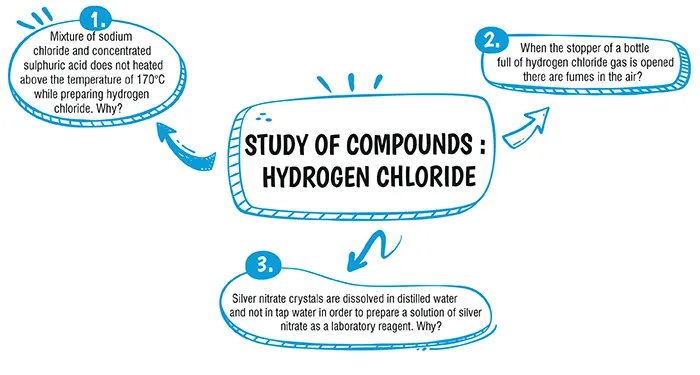Table of Contents

Ans. (d) HPO_3
Explanation:
The reaction of phosphorus pentoxide with hydrogen chloride gives POCl_3 and HPO_3 acid. The reaction is shown as
P_2O_5+HCl→POCl_3 +HPO_3 \\
POCl_3 is not acidic, and hence the acidic product is HPO_3.
Ans. (d) Muriatic acid
Explanation:
An aqueous solution of HCl gas is hydrochloric acid. It was first named by Lavoisier as muriatic acid. Later on, Davy, in 1810, named it as hydrochloric acid.
Explanation:
The mixture of sodium chloride and concentrated sulphuric acid is not heated above 170°C in preparing hydrogen chloride gas because at a higher temperature sodium sulphate is formed which is a hard
substance and difficult to remove from the reaction flask.
2NaCl+H_2SO_4→Na_2SO_4+2HCl
Explanation:
When the stopper of a bottle full of hydrogen chloride gas is opened there are fumes in the air because hydrogen chloride gas has an affinity for water, hence, when the stopper is opened it immediately reacts with water vapour present in the atmosphere which leads to the formation of fumes.
Explanation:
Tap water always contains some amount of dissolved sodium chloride. Thus, when the solution of silver nitrate is prepared in tap water, it reacts to form curdy white precipitate of silver chloride.
AgNO_3+NaCl→AgCl+NaNO_3\\
To prevent the above chemical reaction, the solution of silver nitrate is prepared in distilled water.
Download Mind Map of this chapter
Download NowWant to Practice Mock Tests of this chapter
Practice NowDownload Important Questions of this chapter
Download Now| Chapter No. | Chapter Name |
|---|---|
| Chapter 1 | Periodic Properties and Variations of Properties |
| Chapter 2 | Chemical Bonding |
| Chapter 3 | Study of Acids, Bases and Salts |
| Chapter 4 | Analytical Chemistry |
| Chapter 5 | Mole concept and Stoichiometry |
| Chapter 6 | Electrolysis |
| Chapter 7 | Metallurgy |
| Chapter 8 | Study of Compounds : Hydrogen Chloride |
| Chapter 9 | Study of Compounds : Ammonia and Nitric Acid |
| Chapter 10 | Study of Compounds : Sulphuric Acid |
| Chapter 11 | Organic Compounds |
| Chapter Wise Important Questions for ICSE Board Class 10 Chemistry |
|---|
| Periodic Properties and Variations of Properties |
| Chemical Bonding |
| Study of Acids, Bases and Salts |
| Analytical Chemistry |
| Mole concept and Stoichiometry |
| Electrolysis |
| Metallurgy |
| Study of Compounds : Hydrogen Chloride |
| Study of Compounds : Ammonia and Nitric Acid |
| Study of Compounds : Sulphuric Acid |
| Organic Compounds |
CBSE Important Questions Class 10
ICSE Important Questions Class 10
CBSE Important Questions Class 10
ICSE Important Questions Class 10